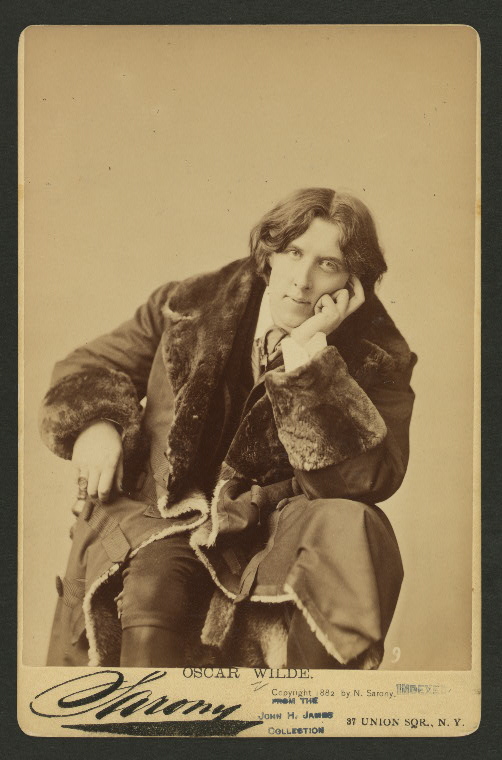Happy Birthday, Oscar Wilde
Like any impressionable artist, Oscar Wilde stood both in and out of his time; in part a product and willing participant of the Victorian Era cultural milieu he was born into and made his name through, and a firm critic of society's ideals and contradictory conventions. To function as an artist at that time spelled paradox—opting themselves and their works into the then fledgling literary market economy in order to hold a mirror up to its image. Wilde and his contemporaries held an awareness of this reality and engaged with the public in a sort of antithetical symbiosis, straddling the thread between celebrity and misanthrope, entrant and adversary. But this in a sense was to be expected. Many to come both before and beyond Wilde recognized the inherently incongruous nature of the craft; the gulf between this dissonance reared itself in the dissolution of the border between their public and private lives and the public’s prying therein. For Wilde, this often meant a nuanced doubling-down, addressing the ad-hominem elephant in the room directly.
After initial reviewers had their negative say of his seminal work, The Picture of Dorian Gray, Wilde had his: “The artist is the creator of beautiful things,” he tells us in the newly added preface to its second publication. “To reveal art and conceal the artist is art’s aim. The critic is he who can translate into another manner or a new material his impression of beautiful things. The highest as the lowest form of criticism is a mode of autobiography….there is no such thing as a moral or an immoral book. Books are well written or badly written. That is all.” Wilde continues in this vein, offering effervescent exhortations on the nature of art in the form of twenty-two epigrams, ending with the following lines, “ Diversity of opinion about a work of arts shows that the work is new, complex, and vital. When critics disagree, the artist is in accord with himself. We can forgive a man for making a useful thing as long as he does not admire it. The only excuse for making a useless thing is that one admires it intensely. All art is quite useless.”
Following The Picture of Dorian Gray, Wilde turned his attention to the theater, and from 1892-1895, made a name for himself as a master playwright of the day, but by the end of the year, he found himself under the thumb of the public and society's mores once again. This time, Wilde’s extramarital affairs were cast into the spotlight and Wilde entered a lengthy courtroom battle with the family of one of his lovers—ending in his imprisonment for gross indeceny and sodomy for two years of hard labor. After his sentence, Wilde wrote his last play, before dying on November 30, 1900.
Though Wilde’s final days were a far cry from his prior days of decadence, he knew well before he passed that the prize was won, that his legacy would linger, and that in a way, as his contemporary Whitman wrote, that he would still be here. Art for art's sake read the banner he flew, but he had not forgotten romanticism. “I can write no stately proem, [preface]”he pens in a poem to his wife, “As a prelude to my lay, from a poet to a poem, I would dare to say.” He tells her, I have no final ceremonious musings for you, no elegant words to recite and recapitulate the entirety of my life and work, or prepare you from my transition from a writer to words that were once written. But, if you listen closely and find in what I have left behind, at least one thing you deem beautiful, in time, you’ll see, and know such tasks are moot; I am with you:
“For if of these fallen petals, one to you seem fair, love will waft it till it settles on your hair, and when wind and winter harden, all the loveless land, It will whisper of the garden, you will understand.”
Thanks for being with us all, Wilde. Happy Birthday.
You can find works by Oscar Wilde in our catalog and explore our Digital Collection holdings relevant to the artist here, here and here or by searching him by name in the search bar.
Read E-Books with SimplyE
 With your library card, it's easier than ever to choose from more than 300,000 e-books on SimplyE, The New York Public Library's free e-reader app. Gain access to digital resources for all ages, including e-books, audiobooks, databases, and more.
With your library card, it's easier than ever to choose from more than 300,000 e-books on SimplyE, The New York Public Library's free e-reader app. Gain access to digital resources for all ages, including e-books, audiobooks, databases, and more.
If you don’t have an NYPL library card, New York State residents can apply for a digital card online or through SimplyE (available on the App Store or Google Play).
Need more help? Read our guide to using SimplyE.
